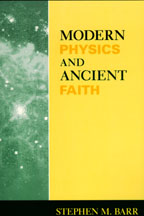| Welcome | May 13, 2010 |
||
Welcome to the ARN Announce email reports. These brief emails are sent out every couple of weeks to help you keep up with the top intelligent design news and resources at a glance, and provide you with quick links to more information. We also provide you with advanced notice of new products and special sales available only to our email subscribers. |
|||
| Product Announcements | |||
|
|||
| ARN News Flash | |||
| |||
| Quotes about Quantum Physics | |||
For those who are not shocked when they first come across quantum theory cannot possibly have understood it. Niels Bohr, Nobel Prize-winning physicist quoted in Heisenberg, Werner (1971). Physics and Beyond. New York: Harper and Row. pp. 206. The premise that you can describe in terms of physics the whole function of a human being…including its knowledge, and its consciousness, is untenable. There is still something missing. Sir Rudolf Peierls, leading theoretical physicist of his time. P.C.W Davies and J.R. Brown, The Ghost in the Atom (Cambridge: Cambridge University Press, 1986), 75. [While a number of philosophical ideas] may be logically consistent with present quantum mechanics,…materialism is not. Eugene Wigner, Nobel Prize-winning physicist. Eugene P. Wigner, “Remarks on the Mind-Body Questions,” in The Scientist Speculates, ed. I.J. Good (London: William Heinemann, Ltd, 1961). The doctrine that the world is made up of objects whose existence is independent of human consciousness turns out to be in conflict with quantum mechanics and with facts established by experiment. Bernard d'Espagnat, French theoretical physicist.d'Espagnat, Bernard, "The Quantum Theory and Reality", Scientific American, Nov. 1979 |
|||
ARN Announce is produced and distributed by Access Research Network. ARN Announce describes many of the upcoming events and new articles,
books, videos and other resources on Intelligent Design. Please forward
this message to several of your friends and colleagues to let them know
about the resources available at Access Research Network (www.arn.org).
Back issues of ARN-Announce can be found at www.arn.org/announce.htm. Access Research Network is a non-profit organization dedicated to providing
accessible information on science, technology and society issues from
an Intelligent Design perspective.
TO SUBSCRIBE: Send an email to "ARN-Announce-request@arn.org". The body of the message should consist of the word "SUBSCRIBE" and nothing else. Or visit the web page at http://arn.org/mailman/listinfo/arn-announce_arn.org and select Subscribe and enter your email address. You will receive a confirmation email indicating your name has been submitted to the list. Follow the directions and reply to the email and your email address will be added to the ARN-ANNOUNCE list. TO UNSUBSCRIBE: Send an email to "ARN-Announce-request@arn.org". The body of the message should consist of the word "UNSUBSCRIBE" and nothing else. Or visit the web page at http://arn.org/mailman/listinfo/arn-announce_arn.org and select Unsubscribe and enter your email address. Your email address will be automatically removed from this list. TO CHANGE YOUR EMAIL ADDRESS: To change your email address, retrieve your password, or change other subscription options, please visit the web page at http://arn.org/mailman/listinfo/arn-announce_arn.org and select the "edit options" button at the bottom of the page. |
